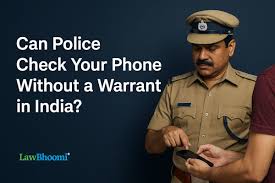Can Police check your phone?
In India, police cannot randomly check or seize your phone without a valid legal reason. They must have reasonable suspicion that your device is connected to a criminal offence or contains evidence relevant to an ongoing investigation.
The Kerala High Court has clearly stated that even if a person is merely suspected of having crime-related information on their phone, the police cannot seize the device arbitrarily. They must follow the established legal process.
What is the Legal Procedure?
Under normal circumstances, the police must obtain either a judicial warrant (court order) or issue a written notice under Sections 91 or 93 of the Criminal Procedure Code (CrPC) to lawfully search or seize a mobile phone.
In urgent or exceptional cases (such as during an ongoing investigation), police may conduct a search without a warrant. However, they are required to record in writing the reasons for bypassing the warrant, including what specific evidence they are looking for.
Once a phone is seized, the process must be properly documented. Ideally, it should be recorded through audio or video means, and a list of seized items must be made, signed by both witnesses and the owner. This documentation is then submitted to a judicial authority.
Access to Phone Data
To access the contents of your phone—such as messages, emails, photos, or app data—court permission is usually required, in accordance with the right to privacy guaranteed by the Supreme Court of India.[1]
Can Police Make You Unlock Your Phone?
As per Article 20(3) of the Indian Constitution, you have the right against self-incrimination. This means you cannot be forced to disclose your password or unlock your phone if doing so would make you provide evidence against yourself.
What Can Police Access?
With proper legal authorization, police can retrieve call logs, contacts, messages, emails, and even deleted data using forensic tools.
Knowing your rights helps protect your privacy and ensures due legal process is followed.
Landmark Cases Related to Police Checking Phones in India
1.Justice K.S. Puttaswamy (Retd.) vs Union of India (2017)
Significance: The Supreme Court declared the right to privacy as a fundamental right under Article 21 of the Constitution.
Impact: This judgment forms the constitutional basis for challenging arbitrary searches and seizures of personal devices, including mobile phones, by the police. Any intrusion into digital privacy must be legally justified and proportionate.
CONCLUSION
In conclusion, the police in India must adhere to strict legal procedures before searching or seizing a mobile phone, ensuring respect for the fundamental right to privacy guaranteed by the Constitution. Arbitrary or random checks are not permitted without reasonable suspicion and proper authorization, such as a judicial warrant or a valid notice under the CrPC. Individuals are protected from self-incrimination and cannot be forced to unlock their devices. These legal safeguards, reinforced by landmark judgments like the Puttaswamy case, emphasize the importance of following due process while balancing law enforcement needs with privacy rights.
[1] https://legalassist.co.in/can-police-check-your-phone-without-a-warrant-know-your-digital-rights/


